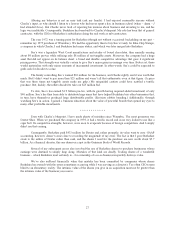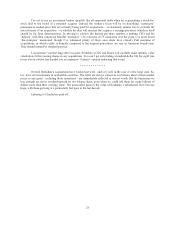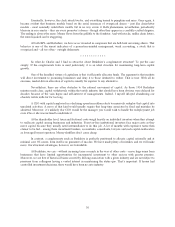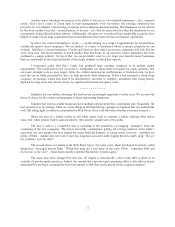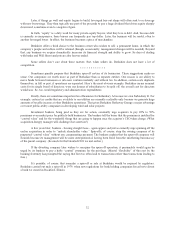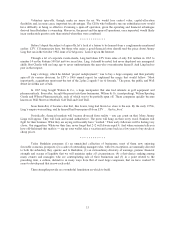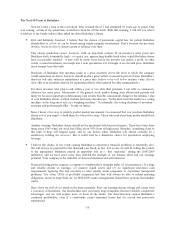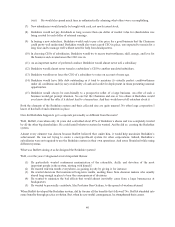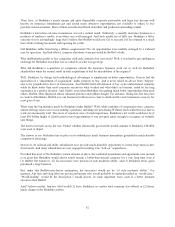Berkshire Hathaway 2014 Annual Report Download - page 34
Download and view the complete annual report
Please find page 34 of the 2014 Berkshire Hathaway annual report below. You can navigate through the pages in the report by either clicking on the pages listed below, or by using the keyword search tool below to find specific information within the annual report.Later, if things go well and equity begins to build, leveraged buy-out shops will often seek to re-leverage
with new borrowings. They then typically use part of the proceeds to pay a huge dividend that drives equity sharply
downward, sometimes even to a negative figure.
In truth, “equity” is a dirty word for many private-equity buyers; what they love is debt. And, because debt
is currently so inexpensive, these buyers can frequently pay top dollar. Later, the business will be resold, often to
another leveraged buyer. In effect, the business becomes a piece of merchandise.
Berkshire offers a third choice to the business owner who wishes to sell: a permanent home, in which the
company’s people and culture will be retained (though, occasionally, management changes will be needed). Beyond
that, any business we acquire dramatically increases its financial strength and ability to grow. Its days of dealing
with banks and Wall Street analysts are also forever ended.
Some sellers don’t care about these matters. But, when sellers do, Berkshire does not have a lot of
competition.
************
Sometimes pundits propose that Berkshire spin-off certain of its businesses. These suggestions make no
sense. Our companies are worth more as part of Berkshire than as separate entities. One reason is our ability to
move funds between businesses or into new ventures instantly and without tax. In addition, certain costs duplicate
themselves, in full or part, if operations are separated. Here’s the most obvious example: Berkshire incurs nominal
costs for its single board of directors; were our dozens of subsidiaries to be split off, the overall cost for directors
would soar. So, too, would regulatory and administration expenditures.
Finally, there are sometimes important tax efficiencies for Subsidiary A because we own Subsidiary B. For
example, certain tax credits that are available to our utilities are currently realizable only because we generate huge
amounts of taxable income at other Berkshire operations. That gives Berkshire Hathaway Energy a major advantage
over most public-utility companies in developing wind and solar projects.
Investment bankers, being paid as they are for action, constantly urge acquirers to pay 20% to 50%
premiums over market price for publicly-held businesses. The bankers tell the buyer that the premium is justified for
“control value” and for the wonderful things that are going to happen once the acquirer’s CEO takes charge. (What
acquisition-hungry manager will challenge that assertion?)
A few years later, bankers – bearing straight faces – again appear and just as earnestly urge spinning off the
earlier acquisition in order to “unlock shareholder value.” Spin-offs, of course, strip the owning company of its
purported “control value” without any compensating payment. The bankers explain that the spun-off company will
flourish because its management will be more entrepreneurial, having been freed from the smothering bureaucracy
of the parent company. (So much for that talented CEO we met earlier.)
If the divesting company later wishes to reacquire the spun-off operation, it presumably would again be
urged by its bankers to pay a hefty “control” premium for the privilege. (Mental “flexibility” of this sort by the
banking fraternity has prompted the saying that fees too often lead to transactions rather than transactions leading to
fees.)
It’s possible, of course, that someday a spin-off or sale at Berkshire would be required by regulators.
Berkshire carried out such a spin-off in 1979, when new regulations for bank holding companies forced us to divest
a bank we owned in Rockford, Illinois.
32







